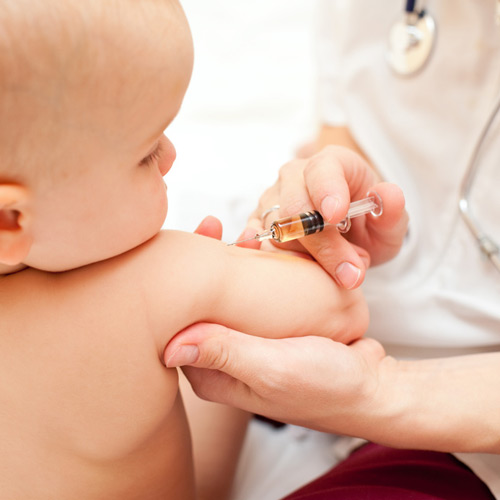10 Things About Pertussis

10 Pertussis Facts for Mom
1. Pertussis (whooping cough) is a serious disease
Pertussis is highly contagious. Its symptoms can include fever, severe coughing, vomiting, sneezing, and a distressed and ill appearance in children. Recovery from pertussis may take a long time and may be followed by additional respiratory infections.1
2. Pertussis is a rising concern.
Studies show there has been over a 90% increase in average annual reported cases of pertussis between 1999-2008 in the United States.2-4
3. Pertussis can make it hard for your baby to breathe.
Pertussis often causes excessive and serious respiratory blockages due to thick mucus. This may cause children to turn blue, appear very ill, vomit, or become exhausted.1
4. Pertussis is more than just a cough
Pertussis can also cause serious complications such as brain damage, pneumonia, seizures, rib fractures, and even death.1,55. Pertussis can be easily spread.
Pertussis is a highly contagious disease that can be spread through respiratory droplets (coughing or contact with saliva).1
6. Infants can develop serious complications from pertussis
Pneumonia, brain damage, and seizures due to pertussis are more common in infants. In fact, % of pertussis-related deaths in 2004-2006 were in infants.1
7. You and your family members can spread pertussis to those around you.
An international study investigated pertussis transmission to infants in 91 families. Of the 44 cases for which a source was identified, a parent or sibling was often the source. Source cases were identified and described by relationship to the infant, age, and household status.6
8. Vaccination can help protect you and your family against pertussis
Pertussis vaccination has helped lead to a dramatic decrease in childhood cases. Pertussis has historically been one of the most common infectious diseases in children.1
9. Pertussis immunity wears off.
Research has shown that immunity to pertussis wears off about 5-10 years after childhood vaccinations, which leaves adults and adolescents at risk for this disease.7
10. Pertussis vaccination is recommended for most members of your family.
The CDCa recommends pertussis vaccination for the following individuals:
DTaPa vaccination:
- Children 2 months through 6 years of age8
Tdapc vaccination (one time booster dose):
- Adults and adolescents 11-64 years of age7,9
- Adults less than 65 years of age who are in close contact with infants younger than 12 months of age (for example, parents, grandparents, child-care providers, and health-care professionals). 9
- Adults who received a Tdd booster 10 or more years ago. An interval as short as 2 years from the last dose of Td is acceptable.9
- New mothers in the immediate postpartum period. Tdap should be administered before hospital discharge.9,10
For more information on anything you've read here, please ask your doctor.
a CDC = Centers for Disease Control and Prevention
b DTaP = Diphtheria, tetanus, and acellular pertussis
c Tdap = Tetanus, diphtheria, and acellular pertussis
d Td = Tetanus and diphtheria.
References: 1. Centers for Disease Control and Prevention (CDC). Epidemiology and Prevention of Vaccine-Preventable Diseases. Atkinson W, Wolfe C, Hamborsky J, McIntyre L, eds. 11th ed. Washington, DC: Public Health Foundation, 2009:199-216. 2. CDC. Summary of notifiable diseases-United States, 2006. MMWR. 2008;55(53):1-94. 3. CDC. Provisional cases of selected notifiable diseases, United States, weeks ending December 29, 2007, and December 30, 2006 (52nd week) MMWR. 2008;56(51& 52):1365. 4. CDC. Data on file (Pertussis Surveillance Reports, 2008), January 2009. MKT17098. 5. Lee GM, Lett S, Schauer S, et al. Societal costs and morbidity of pertussis in adolescents and adults. Clin Infect Dis. 2004;39:1572-1580. 6. Wendelboe AM, Njamkepo E, Bourillon A, et al. Transmission of Bordetella pertussis to young infants. Pediatr Infect Dis J. 2007;26:293-299. 7. CDC. Preventing tetanus, diphtheria, and pertussis among adolescents: use of tetanus toxoid, reduced diphtheria toxoid and acellular pertussis vaccines: recommendations of the Advisory Committee on Immunization Practices (ACIP). MMWR. 2006;55(RR-3):1-43. 8. CDC. General recommendations of immunization: recommendations of the Advisory Committee on Immunization Practices (ACIP). MMWR. 2006;55(RR-15):1-48. 9. CDC. Preventing tetanus, diphtheria, and pertussis among adults: use of tetanus toxoid, reduced diphtheria toxoid and acellular pertussis vaccine: recommendations of the Advisory Committee on Immunization Practices (ACIP) and recommendation of ACIP, supported by the Healthcare Infection Control Practices Advisory Committee (HICPAC), for use of Tdap among health-care personnel. MMWR. 2006;55(RR-17):1-37. 10. CDC. Prevention of pertussis, tetanus, and diphtheria among pregnant and postpartum women and their infants: recommendations of the Advisory Committee on Immunization Practices (ACIP). MMWR. 2008;57(RR-4):1-51.
Brought to you as a public health service by Sanofi Pasteur Inc.
MKT18154-1 5/10
 PREGNANCY
PREGNANCY  GIVING BIRTH
GIVING BIRTH  BABY CARE
BABY CARE  HEALTH & SAFETY
HEALTH & SAFETY  FUN STUFF
FUN STUFF  FAMILY
FAMILY 